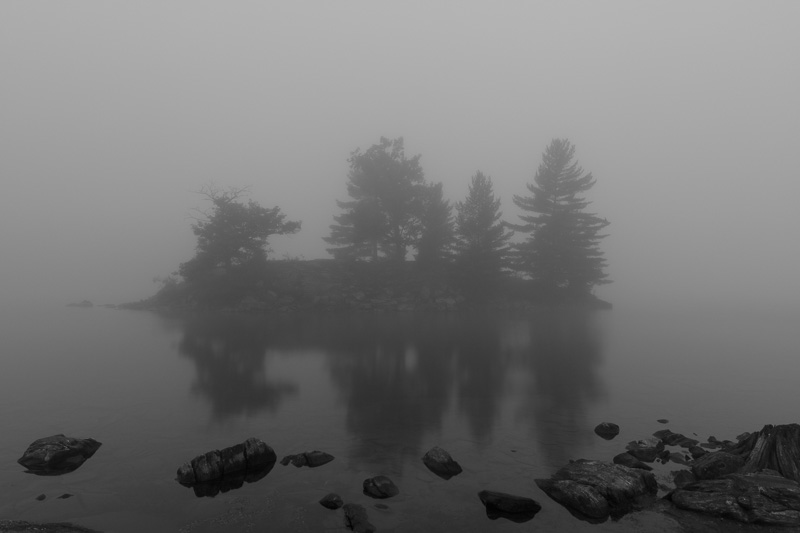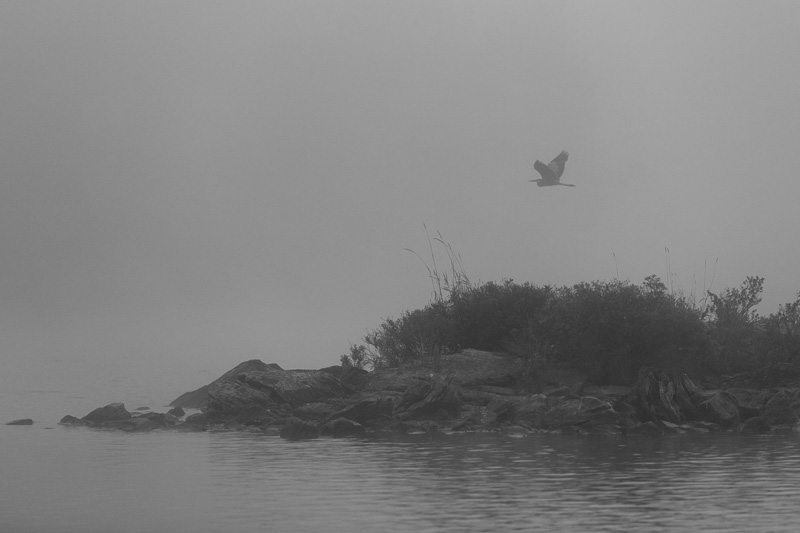The Minden weather forecast calls for early morning fog. I wake up at five and peek out the bedroom window to confirm that, yes, a thick fog has settled over Bob Lake. I carry my gear down to the water’s edge and leave it there while I get the canoe from a stand of birch trees. It’s a heavy brute and I hobble with it down to the sand before letting it go. With a flashlight, I root around the boat house for a life jacket and paddle, then toe the concrete block back into place to hold the door shut. Back at the water’s edge, I scratch my head and stare at the canoe. Which end is the bow and which the stern? I’ve been living in downtown Toronto six years now and my citified ways have pushed even the simplest things out of my brain.
I hear only the sloop of my paddle through the water; the fog has silenced everything else. I’m headed to an island. I don’t know if the island has an official name, but I’ve taken to calling it Bird Island because, when I went there one afternoon earlier in the week, I found it occupied by a flock of Canada geese. Or is that a gaggle? Ahead is the vague outline of a dock. When I reach the dock, there is nothing beyond it; the island has vanished. With a few more strokes, I look over my shoulder and see that the dock has vanished too. I am utterly alone, rocking gently on the water, only the bow in sight and a couple metres of water beyond it. To reach the island, I’ll have to trust my memory, that and a faint lightening of the sky overhead where the moon vies with the fog. Even if I miss the island, it won’t matter; it’s a small lake and soon enough I’ll hit the shore. I’m so alone, not even thoughts of fear enter my mind to disturb me. And then a rocky outcrop, which is my goal, and then beyond it, across a narrow channel, the trees of Bird Island.

In my freshman year, I took an introductory course titled Greek and Roman Civilization. The professor was an intimidating woman named Dabrowski, given to grand pronouncements which were impossible to challenge. One such pronouncement was that high tragedy—the work of Euripides and Shakespeare—was possible only in an integrated society, one in which all its citizens shared a view of its place in the world and of its destiny. The closest we in North America had come to such a feeling of integration was at the time of JFK’s assassination, when strangers would hold each other in the streets and weep together. Given that most of the students, myself included, had been in diapers when JFK was assassinated, none of us could attest to this feeling. Years later, I find the notion of an “integrated society” suspect, as I do the certainty of my professor’s tone.
John Donne was a contemporary of William Shakespeare, a fellow citizen of that integrated Jacobean society, famous for his poetic observation that “No man is an island, / Entire of itself …” His observation illustrates how the simple act of observation is never simple. Its outcome is determined in part by its framing, and framing is an act of exclusion. If no man is an island, what of woman? If “Europe is the less” should “a clod be washed away by the sea”, what of the other six continents and their people? It was easy for Donne to celebrate a feeling of common humanity because his social position qualified him to participate in a way that perhaps blinded him to the contingent nature of his privilege. In the same way, Euripides could participate in the early democratic experiment called Athens because he was born a free man and held property and was therefore entitled to vote. Meanwhile, at least in ancient Greece, an entire world lay beyond the frame.
It is easy to quibble with John Donne, especially today when our apparently fractured lives stand as evidence that human experience is fundamentally alienated. We dismiss the Athenian and Jacobean tragic poets and look to other sources to bolster our view of things: the expulsion of Adam from the Garden of Eden, Camus’ view of life as fundamentally absurd. Again we can frame our observations to confirm our claims. We frame matters to exclude those points of connection that make it problematic to assert that human experience is fundamentally alienated. And so: “Every man is an island, / Entire of itself …”
The vacillation, and the endless manipulation that framing engenders, grows tiresome. I am inclined to adopt a third way, holding that human experience plays out along the line of an irresolvable tension. In my view, it’s fruitless to conduct the conversation as either/or, but rather as both/and. When I examine my own experience, I find that it is possible simultaneously to feel held in community and to feel desperately lonely. These are not mutually exclusive states. No one can ever know what it’s like to be me, to occupy this acutely personal space of self-aware sentience. Yet most people are capable of empathy, or of reasoning by analogy, or of exercising a poetic imagination. These capacities may be withered by the times, but they do not disappear. After all, we are—all of us—human. That does not change.

I reach the rocky outcrop before six; sunrise is half an hour away, but the fog is indifferent. I want to photograph Bird Island in the fog before dawn, its scattering of pines, two oaks, and a solitary birch sapling, its stillness, its huddle of granite boulders almost afloat on the water. I frame the island and its trees, and their reflections in the intervening channel. Framing may be an act of exclusion, but here the exclusion is not entirely my doing. The fog excludes the far shoreline, separating the island from all that should hold it, breaking it free of its native landscape and suspending it, like a ghost, in space and time. It evokes a feeling of solitude, stubbornly denying John Donne’s words.
I stay until eight. The shore is visible now, although still shrouded. Stringy wisps scud just above the water’s surface. The island is no longer alone, but has rejoined the larger landscape. A boat appears through the wisps. A man holds a fishing rod and drifts by in silence. We ignore each other. A shouted greeting would disturb the fish and, more to the point, would destroy the illusion I’ve drawn down upon myself that I’m somehow alone.